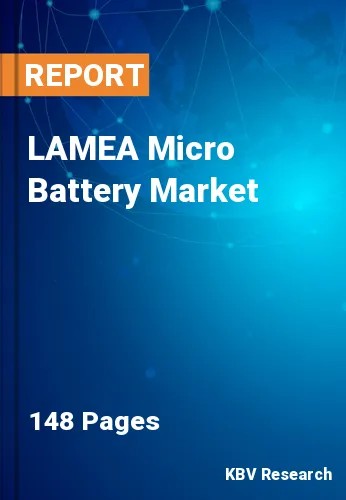
The Latin America, Middle East and Africa Micro Battery Market would witness market growth of 24.4% CAGR during the forecast period (2023-2030).
The widespread use of smart cards and e-cards in the transportation and government sectors will encourage the adoption of these batteries. Smart cards enable user identification, authentication, data storage, and application processing, increasing their popularity around the region. The increasing use of Visa, Mastercard, and Europay smart cards drives the market.
The Internet of Things is expanding quickly due to sensor & communication technology improvements, availability, affordability, and technological advancements in personal computing devices. This has created new opportunities and challenges for the research of wearable medical devices. Wearable sensors allow users to recognize and track various clinically important information, including functional motions, biomechanical and vital factors, and athletes' workloads, to improve performance while lowering the risk of injury.
Wearable monitoring equipment can provide a continuous, real-time flow of physiological data, allowing for the development of accurate treatment plans and player-specific training programs to reduce or eliminate injuries. All these factors will increase the usage of wearable technologies further supporting the market’s expansion in upcoming years.
There are numerous opportunities for both investors and enterprises in the Middle East, which is a lively and fast-rising region. Numerous elements in the region make it ideal for being at the forefront of implementing new technologies, such as IoT. By 2023, there will be about 43 billion IoT-connected devices worldwide, a nearly threefold increase from 2018. From 13% in 2014 to roughly 25% in 2019, more firms in the UAE are utilizing IoT technologies. Energy, healthcare, and transportation are just a few of the sectors that will benefit from innovative IoT solutions. The market is anticipated to develop as a result of the increasing use of IoT.
The Brazil market dominated the LAMEA Micro Battery Market by Country in 2022, and would continue to be a dominant market till 2030; thereby, achieving a market value of $34.4 million by 2030. The Argentina market is estimated to grow at a CAGR of 25.1% during (2023 - 2030). Additionally, The UAE market would register a CAGR of 24.1% during (2023 - 2030).
Based on Battery Type, the market is segmented into Secondary, and Primary. Based on Type, the market is segmented into Thin Film Batteries, Printed Batteries, Solid-state Chip Batteries, and Button Batteries. Based on Material, the market is segmented into Lithium, Alkaline, and Silver Oxide & Others. Based on Application, the market is segmented into Medical Devices, Smart Packaging, Consumer Electronics, Smart Cards, Wireless Sensors, and Others. Based on Capacity, the market is segmented into 10-100 mAh, Below 10 mAh, and More than 100 mAh. Based on countries, the market is segmented into Brazil, Argentina, UAE, Saudi Arabia, South Africa, Nigeria, and Rest of LAMEA.
Free Valuable Insights: The Worldwide Micro Battery Market is Projected to reach USD 2.1 Billion by 2030, at a CAGR of 22.2%
The market research report covers the analysis of key stake holders of the market. Key companies profiled in the report include Panasonic Holdings Corporation, VARTA AG, Murata Manufacturing Co., Ltd., TDK Corporation, Berkshire Hathaway, Inc. (Duracell, Inc.), Ultralife Corporation, Maxwell Technologies (UCAP Power, Inc.), Cymbet Corporation, Enfucell Oy, Koch Industries, Inc. (Molex LLC).
By Battery Type
By Type
By Material
By Application
By Capacity
By Country
Our team of dedicated experts can provide you with attractive expansion opportunities for your business.
